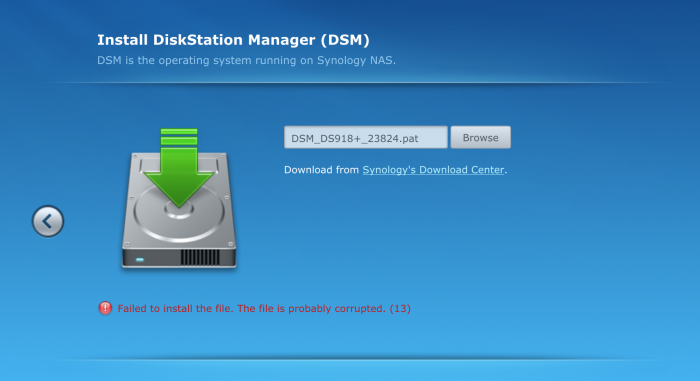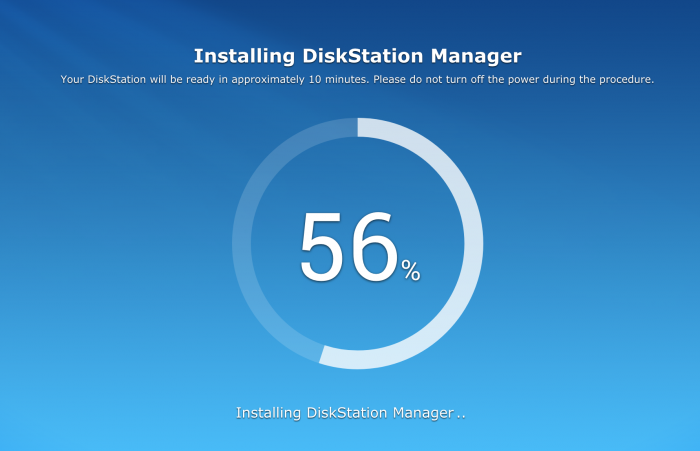
jhonny
Rookie-
Posts
7 -
Joined
-
Last visited
Recent Profile Visitors
The recent visitors block is disabled and is not being shown to other users.
jhonny's Achievements

Newbie (1/7)
0
Reputation
-
Please note the drives are actually SATA M.2 (NGFF) drives and not NVME. My mistake !
-
- Outcome of the update: SUCCESSFUL - DSM version prior update: FRESH INSTALL - Loader version & Model: TCRP 0.9.3.0 (VMDK version or non-UEFI version) - Installation type: ESXi 8.0 or BAREMETAL - Gigabyte C246M-WU4, i7 8700, 64GB RAM, 10Gtek 2x1GB Intel 82576 Ethernet Adapter, StarTech M.2 PEXM2SAT3422 - Additional comments: Used 3622 as a basis Check out my tutorial on how to get M.2 NVME disks in DSM:
-
jhonny started following DSM 7.1.1 on Gigabyte C246M-WU4 (Baremetal or ESXi 8.0)
-
Just wanted to report that Gigabyte C246M-WU4 is an excellent choice for building using Tinycore Redpill. You can configure it both using ESXi 8.0 and put the SATA controller in passthrough mode or you can deploy TinyCore natively to the system and it works perfectly. Hot swap of drives works as well. So does onboard Ethernet. And with the StarTech PEXM2SAT3422 adapter I have 2 NVME drives that show up as SSD's in DSM (when the adapter is setup in JBOD mode). I can create a RAID1 on them as well in DSM. Alternatively I can create a virtual disk from the two NVME drives on the PEXM2SAT3422 adapter and present that as a virtual disk and install ESXi on it. Hardware I used: CPU: i7 8700 (non-k) RAM: 4 x 16GB Corsair 2666 MHz memory MOBO: Gigabyte C246M-WU4 CASE: UNAS NSC-810A USB: SanDisk Fit 32GB PCI: StarTech 2 x M.2 adapter, model: PEXM2SAT3422 PCI: 10Gtek Intel 82576 2 port ethernet card Here are the instructions for setting DSM 7.1.1 up in ESXi 8.0: Here are the instructions for setting DSM 7.1.1 up in baremetal mode:
-
Just a small update ... I finally got DSM installed on the ODROID-H2. I had to use a donor board. Setup DSM 6.2.1 using juns 1.04b loader and DSM_DS918+_23824.pat on an Asrock z390 board with 9900x and a PCIe Realtek network card (onboard card did not work). Once DSM was installed on the USB I moved it and the SATA HDD to the ODROID-H2 and it booted up. Now I'm trying to install the DSM using eMMC instead of USB and it seems the box fails to boot. If I flash juns loader onto the eMMC, I will see the loader boot up, and the usual splash screen comes up, however beyond that there is no activity. The ODROID H2 does not get an IP, doesn't connect to the network yet network lights are up. If I put the eMMC onto a eMMC->USB adapter and boot the ODRID-H2 from that it works perfectly. Any ideas ?
-
Small update. So I managed to get around issue b and try other loaders. The way I fixed that was used a new BOOTx64 loader for the /EFI/BOOT/BOOTx64.EFI I injected the BOOTx64.EFI from Jun's 1.04b loader into older loaders and they seem to work fine. However, issue a still persists ... so I've tried 1.02b and I'm still running into error 13 issues. Can anyone tell me how to do a force install ? I've tried googling but haven't been able to find a guide how to run a force install
-
Hi guys, Long time lurker, first time poster. I've been trying to get Xpenology running on the ODROID H2. Its an awesome little piece of hardware. 4 cores, up to 32gb ddr4 ram, nvme, 2 x sata, 2 x realtek 8111G lan in the size slightly larger than a nuc. Anyway, Im getting off topic here but basically I'm running into the following issues: a) If I use loader 1.04b and try to install ds918 I get error 13 right after the installation reaches 56%. b) If I use any loader prior to that, the system doesn't even boot into grub, just hangs at the bios screen right before grub Regarding issue a) I've tried installing the system with various options in the bios, setting the USB Drive to be detected as HDD, Floppy, Forced floppy .... there's even a south bridge setting for making the device more Linux or Windows compatible, I've tried playing with that .... still doesn't work. I've tried installing the system with 1 stick of ram, 1 hdd, no nvme drive connected. I've tried 5 different brands of USB's including a USB 2.0 card reader. Each time of course I would update the PID and VID accordingly to the USB stick used. I've tried the following images: DSM_DS918+_23739.pat DSM_DS918+_23824.pat I just keep getting error 13. Regarding issue b) I've tried different imaging tools: Win32Imager, Rufus etc .... nothing seems to allow the device to boot correctly. I've even tried running Genesys MBR version of the loaders and that doesn't work either. Same problem, system just gets stuck before getting to grub. It would be awesome to get ds918 running on this little box as perhaps I could make use of the nvme caching ? Unfortunately troubleshooting this is proving difficult as there's no COM ports that I can break out to on this board, even though there is console redirection in the bios. My grub config: if serial --port=0x3F8 --speed=115200;then set has_serial=true terminal_input --append serial terminal_output --append serial else clear fi terminal_input --append console terminal_output --append console if [ x"${grub_platform}" = xefi ]; then insmod efi_gop insmod efi_uga else insmod vbe fi set extra_initrd="extra.lzma" set info="info.txt" set vid=0x0781 set pid=0x5583 set sn=1780PDN123456 set mac1=001E064xxxxx set mac2=001E064xxxxx set rootdev=/dev/md0 set netif_num=1 #set extra_args_918='earlycon=uart8250,io,0x3f8,115200n8 earlyprintk loglevel=15 memmap=0x1000$223515000' set extra_args_918='' set common_args_918='syno_hdd_powerup_seq=1 HddHotplug=0 syno_hw_version=DS918+ vender_format_version=2 console=ttyS0,115200n8 withefi elevator=elevator quiet syno_hdd_detect=0 syno_port_thaw=1' #for testing on VM set sata_args='SataPortMap=4' set default='0' set timeout='1' set fallback='1' if [ -s $prefix/grubenv ]; then load_env if [ -n "$saved_entry" ]; then set default="${saved_entry}" fi fi VERSION="with Jun's Mod v1.04b" search --file -s /bzImage function savedefault { if [ -s $prefix/grubenv ]; then saved_entry="${chosen}" save_env saved_entry fi } function do_option { if [ $# -lt 2 ]; then eval "set value=\"\$$1\"" echo "current $1: $value"; return; fi set key=$1 shift set $key="$*" if [ -s $prefix/grubenv ]; then save_env $key fi } function vid { do_option vid $@; } function pid { do_option pid $@; } function sn { do_option sn $@; } function mac1 { do_option mac1 $@; } function mac2 { do_option mac2 $@; } function mac3 { do_option mac3 $@; } function mac4 { do_option mac4 $@; } function rootdev { do_option rootdev $@; } function append { do_option extra_args_918 $@; } function vidpid { if [ $# -lt 2 ]; then echo "usage: vidpid 0xVVVV 0xPPPP"; return; fi set usb_args="vid=$1 pid=$2" if [ -s $prefix/grubenv ]; then save_env usb_args fi } function showtips { if [ -n "$has_serial" ]; then terminal_output --remove serial fi echo "Screen will stop updating shortly, please open http://find.synology.com to continue." echo echo if [ -n "$has_serial" ]; then terminal_output --append serial fi } function loadinitrd { if [ -s $img/$info ]; then if [ -n "$has_serial" ]; then terminal_output --remove serial fi cat $img/$info if [ -n "$has_serial" ]; then terminal_output --append serial fi fi # if [ -s $img/$extra_initrd ]; then # initrd $img/rd.gz $img/$extra_initrd # else # initrd $img/rd.gz # fi } function common_add_option { eval "set value=\"\$$1\"" if [ -z $value ]; then return 1; fi set common_args="$common_args $1=$value" } function common_add_option_ex { eval "set value=\"\$$1\"" if [ -z $value ]; then return 1; fi set common_args="$common_args $2=$value" } function loadlinux { set model=$1 set bootdev=$2 shift 2 if [ -n $vid -a -n $pid ]; then set usb_args="vid=$vid pid=$pid" fi eval "set common_args=\"\$common_args_$model\"" eval "set extra_args=\"\$extra_args_$model\"" eval "set bootdev_args=\"\$${bootdev}_args\"" common_add_option_ex rootdev root common_add_option sn if common_add_option mac1; then set netif_num=1; fi if common_add_option mac2; then set netif_num=2; fi if common_add_option mac3; then set netif_num=3; fi if common_add_option mac4; then set netif_num=4; fi common_add_option netif_num if [ -z $zImage ]; then set zImage=bzImage fi linux $img/$zImage $common_args $bootdev_args $extra_args $@ } menuentry "DS918+ 6.2.1/6.2 Baremetal $VERSION" --class os { set img= savedefault loadlinux 918 usb loadinitrd showtips } menuentry "DS918+ 6.2.1/6.2 Baremetal $VERSION Reinstall" --class os { set img= loadlinux 918 usb mfg loadinitrd showtips } menuentry "DS918+ 6.2.1/6.2 VMWare/ESXI $VERSION" --class os { set img= savedefault loadlinux 918 sata loadinitrd showtips } Output from Mac about USB key's VID / PID: Product ID: 0x5583 Vendor ID: 0x0781 (SanDisk Corporation)

